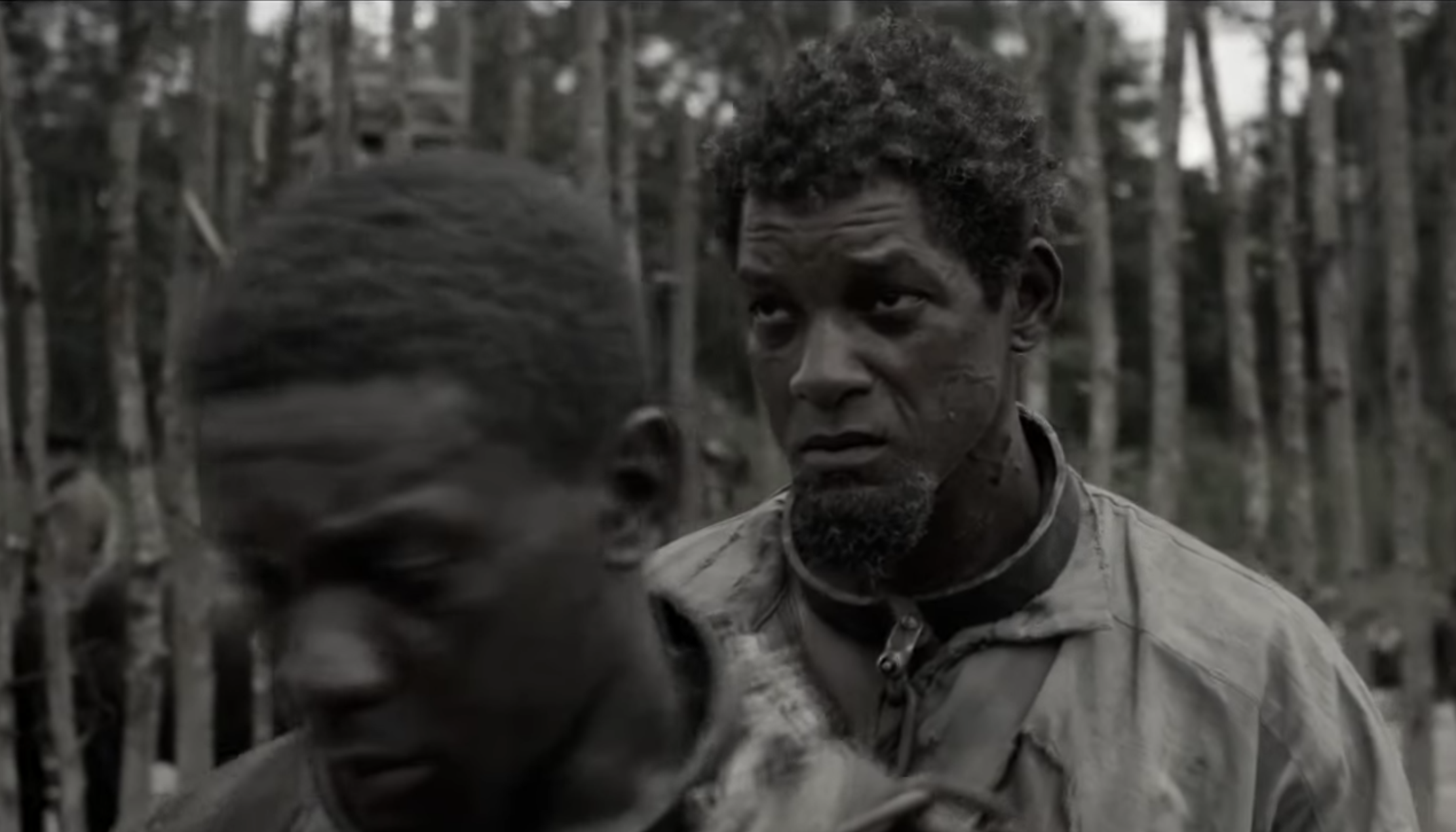Antoine Fuqua‘s Emancipation begins streaming on Apple+ three days hence (12.9), and I’ll tell you straight and true that it didn’t make me feel miserable. Nor did I find it boring. A fair amount of it is “believable” as far as that concept goes. And Will Smith‘s performance as Peter, a Louisiana slave who escapes from a work camp by running, splashing, wading and rowing his way across endless miles of swamp, is very commendable — there isn’t a single thing that Smith does or says that feels phony or pushed or sentimentalized or…okay, Smith’s Peter is a little Hollywoody.
Smith grew (or pasted on) a chin beard and dropped several pounds to remind us that slaves were almost certainly never well-fed.
There is, however, a thing that’s missing from this 132-minute action film, and that’s any sense of surprise. Nothing happens that you don’t expect to see, or that you don’t see coming from a mile away. Each and every white slave driver (including the top-dog psychopath, played by Ben Foster) is cruel, vicious and repellent as hell. Not to mention bearded and smelly-looking and afflicted with bad teeth (and almost certainly halitosis).
A surprise would have been for one white scumbag to be a little less evil than the others, perhaps a tiny bit guilt-ridden or even briefly, momentarily decent in his treatment of the slaves. But no — every single slaver is pure reprehensible scum. Which they were, of course, but you know what I’m saying…trying for a little originality or the unexpected is always appreciated.
A film such as this (based on fact but fueled by an expected catharsis in which the runaway good guy prevails at the end) is basically about rooting for the gruesome deaths of the scurvy white guys. There’s a slave revolt moment (Spartacus rebranded) that I especially enjoyed. Ditto the third-act moment when Smith murders the black collaborator (a replay of the climactic scene in Django Unchained when Jamie Foxx kills Samuel L. Jackson‘s Uncle Tom. I was puzzled by a scene in which Smith’s left-behind wife Dodienne (Charmaine Bingwa) mutilates herself with a cotton gin, but we’ll let that go.
The basic idea behind Emancipation is “how would it be if it wasn’t Peter but the Philadelphia-born Will Smith suffering as a slave in 1860s Louisiana, and if Smith, being a hot-shot movie star in the guise of a slave, was smarter and tougher and more tenacious than anyone else in the film”…so tough and tenacious that he fights off an alligator while underwater and then kills this growling beast with a sharp knife, just like John Wayne killed that Native American warrior in the first act of Red River.”
But let’s understand that Smith’s bad-ass slave is a satisfying heroic figure — a guy you’re glad to hang with. You don’t want him to die or get captured, and you definitely want him to fight and kill the psychopathic Foster in the third act. You want him, in short, to be Sylvester Stallone in First Blood, and he occasionally rises to that occasion.
But again, there are no surprises. I decided during the film’s first third, at which point I knew that Emancipation would be rife with cliches, that Ben Foster should be attacked by a gator while taking a poop, and then dragged into deep water and drowned and then eaten. Or, failing that, if he could get bitten by a cottonmouth snake and thereby weakened by the venom, leaving him no choice but to lie down in order to gradually gather his strength and is then attacked by a gator and dragged underwater. That would wake you right up — for a venal white character to die not for the sins of racism and cruelty, but because he was unlucky in a damp and dangerous environment.
But at the end of the day I didn’t feel too much hurt from Emancipation. Lots of white-guy hate, but how can anyone say it’s not justified in this context? Justified but not that interesting. But if you watch it with your expectations suitably lowered…if you remind yourself that Fuqua is a genre guy — basically a proficient hack — and there’s no way this film is going to knock anyone out…if you watch it with these understandings, it isn’t all that bad of a sit.
Sidenote: I tried reviewing Emancipation late last week and it just wouldn’t come. I don’t think I cared enough one way or another.
I did, however, admire Robert Richardson‘s desaturated, bordering-on-monochrome color scheme. It would have been ballsier to go with straight black-and-white, of course, but Fuqua doesn’t have that kind of integrity.

